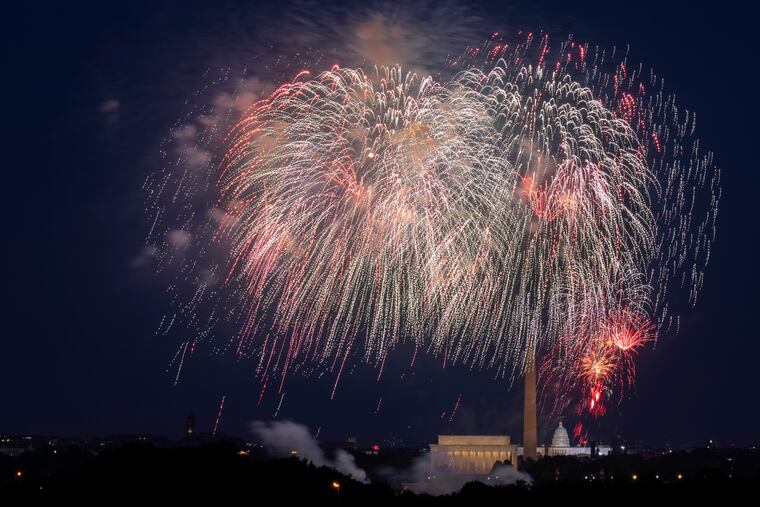For July 4th, progress against COVID-19 offers hope and warnings about the future | Trudy Rubin
On July 4th, our exit from coronavirus lockdowns, we must face the strengths and weaknesses of democracy revealed under COVID-19.

This is an exceedingly strange July 4th holiday, both exhilarating and scary.
The exhilaration stems, of course, from the liberation from COVID-19 that a majority of Americans are feeling. The statistics are startling and impressive.
As of June 30, 54% of all Americans, including those under 18, had received at least one shot, and 46% were fully vaccinated, according to Our World in Data. There were 13,683 new U.S. cases this June 30 compared with 48,389 on June 30, 2020, and 300,777 on Jan. 8 — and the death rate keeps shrinking.
So, vaccinated or not, many families across the country were headed this weekend for crowded beaches, and for mass events, with get-out-of-jail enthusiasm. I’ll be taking my grandson and his parents to his much-missed IHOP for pancakes. Then, for the first time in 15 months, we’ll visit the Camden Aquarium.
The scary part of this holiday, however, is that the uber-contagious Delta coronavirus variant lurks in the background. Southern states with low vaccination rates are vulnerable to a resurgence of sickness. Meantime, poorer countries lack vaccine, although President Biden is pushing allied democracies to help supply them, with one billion doses pledged so far. Much more is needed, or new virus variants could travel here.
So the message of America’s fight to curb COVID-19, as we celebrate Independence Day, is twofold: America’s democracy is still capable of rising to a dangerous challenge — but could do far, far better if the country would unite in such battles, instead of tearing itself apart.
» READ MORE: How the Chinese Communist Party's 100th anniversary relates to our July 4th I Trudy Rubin
As the country reopens, Americans need to know why the richest democracy on earth performed so miserably until vaccines became available. Over 600,000 men, women, and children in the U.S. died of COVID-19, the most of any country; we have suffered 15% of the world’s deaths with only 4% of its population.
The New Yorker’s brilliant staff writer Lawrence Wright lays out the primary causes in his new book, The Plague Year: America in the Time of Covid. Crucial factors were initial secrecy from China, and lack of access to data since then. Add to that an underfunded U.S. national and local public health system that had long been allowed to deteriorate.
But the prime factor was lack of leadership at the top, notably a U.S. president in denial, who promoted fake cures and “debunked” masking, while refusing to mobilize federal resources to provide testing, tracing, and personal protective equipment.
Yet, as Wright points out, the innumerable first responders who pulled together at local levels, the doctors and nurses who faced death, the communities that banded together, showed local democracy at its best, even when abandoned by the White House.
And when President Trump, in his one, major saving grace, funded Operation Warp Speed to produce vaccines, American scientists showed their brilliance. What’s tragic are the tens or hundreds of thousands of lives that could have been saved with strong White House leadership before vaccines.
Still, what is also inspiring is the Biden team’s performance in getting the vaccine into arms. The Trump team left in place no mass vaccination program, and even refused to brief the Biden team on crucial data before he left office.
Biden will come very close to meeting his goal of at least one shot for 70% of adults by July 4 (on July 1, the country was on track for 67.6%).
And this is despite the fact that Trump refused before and after leaving office to promote masking; indeed, he has encouraged the public to reject masks. Nor has he ever publicly promoted vaccinations, which has persuaded many staunch anti-vaxxers to reject shots in red states. How bizarre that an ex-president who brags about his role in vaccine discovery refuses to lead the charge to protect America with the highest possible rate of shots.
So the progress America has made in surmounting COVID-19 thus far is all the more impressive given that it comes despite the negative impact of the GOP leader’s behavior.
This progress also has a major impact on America’s standing abroad.
As revealed by a recent Pew poll of publics in 16 U.S. allied countries, few believe that American democracy in its current state serves as a good model for other nations, although they think it used to be one. One of the major reasons for this widespread perception was how poorly the United States handled the coronavirus epidemic.
» READ MORE: Afghan girls and women in grave danger after US troops leave I Trudy Rubin
Global views of U.S. leadership in this poll soared after Biden’s election, but were still affected by America’s shocking incompetence vs. COVID-19 under Trump, an incompetence played upon by China globally to claim that authoritarians can do better.
“We have to discredit those who believe that the age of democracy is over, as some of our fellow nations believe,” Biden told Britain-based U.S. troops on his recent trip to Europe. “We have to expose as false the narrative that decrees of dictators can match the speed and scale of the 21st [century] challenges.”
COVID-19 tested that premise all during 2020, as Trump-led partisan warfare continues to do. But this July 4th — at least when it comes to the coronavirus — we can hope that our democracy has moved back onto the right track.